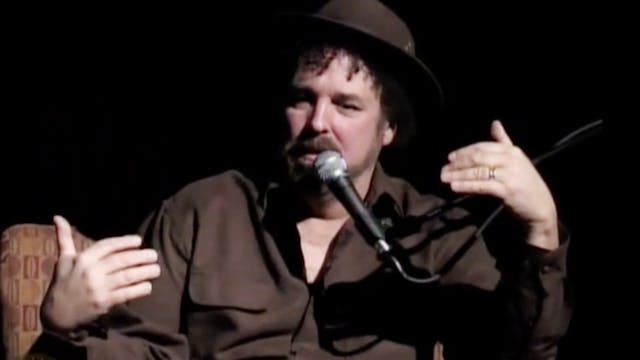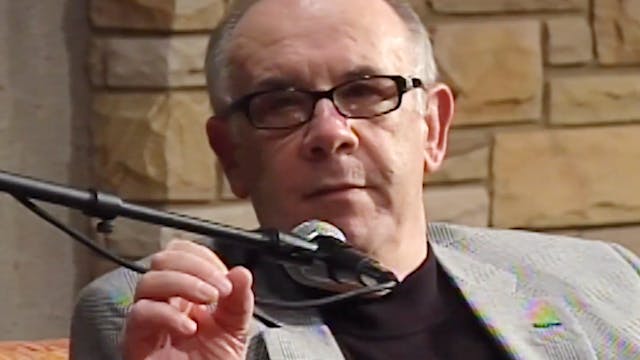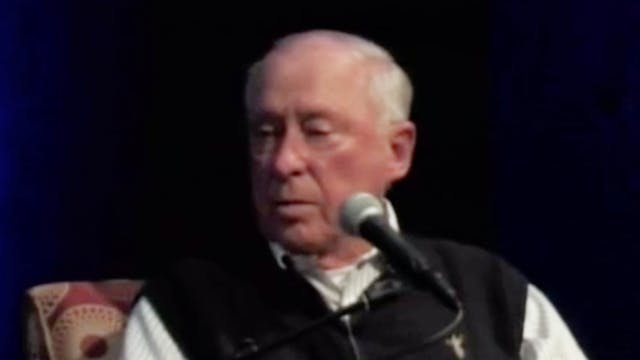Steve Gibson • Nashville Cats, 2014
Nashville Cats
•
1h 38m
Steve Gibson—an accomplished studio session guitarist who, by his estimation, has contributed to more than 14,000 songs—discusses his Midwestern roots and Nashville’s 1970s creative community during this hour-plus program, held on June 28, 2014, as part of the Country Music Hall of Fame and Museum’s Nashville Cats series. Gibson also explores his numerous career highlights as a producer, studio owner, and musical director.
The program opens with a 1974 video clip from “The Midnight Special” that shows Gibson playing guitar on Dave Loggins’s classic hit “Please Come to Boston.” (He also played on the studio recording.)
Gibson explains how, growing up in the factory town of Peoria, Illinois, he tuned in to the Grand Ole Opry on the radio in his parents’ 1955 Buick. His older brothers’ record collections introduced him to rock & roll, and he furthered his fledgling music career through mentors such as veteran entertainer Cowboy Jack Freeman and country singer Jack Reno. But it was an experience recording at Jerry Milam’s Golden Voice Recording Studio that convinced Gibson that he wanted to be involved in making records.
The audience hears clips of early Gibson recordings, including his first, an instrumental titled “Alone in a Dream,” and Carl Trent’s 1970 recording of “Caterpillar Man,” with Gibson on guitar. Gibson recalls playing guitar in pick-up bands for country stars such as Jimmy C. Newman and Don Gibson, then discusses his decision to turn down a touring gig for Nat Stuckey. Instead, Gibson moved to Nashville, thanks to advice from promoter and mentor Bob Milsap. Gibson arrived in Music City on June 6, 1972, and played a session later that night.
He recounts his time working with Buzz Cason at the Creative Workshop studio, and says that demo sessions—“the learning fields”—taught him how to recognize great songwriters, play well with others, and make relationships with engineers. Gibson also shares memories of being neighbors with songwriters Dave Loggins and Guy Clark, as well as touring with (and later producing) Lynn Anderson.
The guitarist reminisces about a broad mix of people he’s worked with, including producer Kyle Lehning, Gene Cotton, Michael Johnson, Kris Kristofferson, George Harrison (in the band Splinter), and John Anderson. His playing is heard on clips by B.J. Thomas, England Dan & John Ford Coley, Randy VanWarmer, Randy Travis (“Hard Rock Bottom of Your Heart”), and Patty Loveless (“Blame It on Your Heart”).
Toward the end of the program, Steve Gibson gives insight into why he likes working on television shows (including the CMA Awards broadcast), his role as musical director at the Grand Ole Opry (a position created for him in 2002), experiences as a former owner of OmniSound Studios, and production work with artists including Sarah Darling and Mandy Barnett.
Accompanied by musicians Bobby Ogden and Mike Noble, Gibson concludes the program with instrumental performances of Tammy Wynette’s “You and Me” and Chet Atkins and Jerry Reed’s “Serenade to Summer.”
FOR MORE
Explore the Museum’s public programming: https://countrymusichalloffame.org/plan-your-visit/exhibits-activities/public-programs/
FOLLOW THE MUSEUM
Instagram: https://www.instagram.com/OfficialCMHOF/
Facebook: https://www.facebook.com/countrymusichof/
Twitter: https://twitter.com/countrymusichof
Up Next in Nashville Cats
-
Eddie Bayers • Nashville Cats, 2010
Eddie Bayers—whose studio credits include classic hits by Rodney Crowell, The Judds, and George Strait—describes close calls and setbacks that he endured prior to becoming one of Nashville’s most prominent drummers.
Held on February 13, 2010, the program is part of the Country Music Hall of Fame...
-
Jerry Kennedy • Nashville Cats, 2008
Jerry Kennedy explores his career as a recording artist, guitarist, producer, and label executive in this wide-reaching interview, held February 16, 2008, at the Country Music Hall of Fame and Museum.
During the program, part of the Museum’s Nashville Cats series, Kennedy shares his experiences...
-
Arranger and Musical Director Bill Wa...
Bill Walker, a formally trained musical arranger and conductor, traces his career from Australia to Nashville, where he helped artists such as Johnny Cash, Eddy Arnold, and the Statler Brothers sound their best on stage and in the studio. This interview, held at the Country Music Hall of Fame and...



